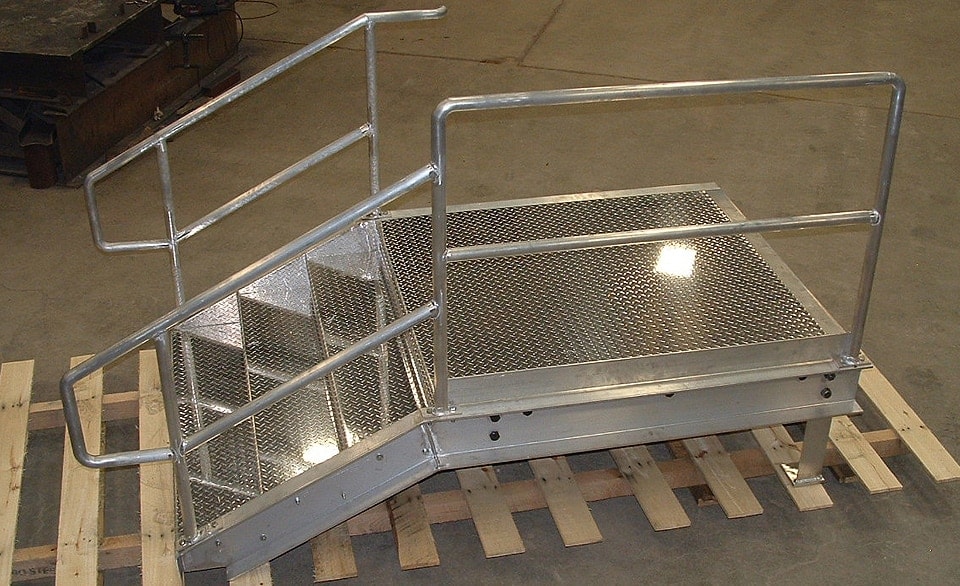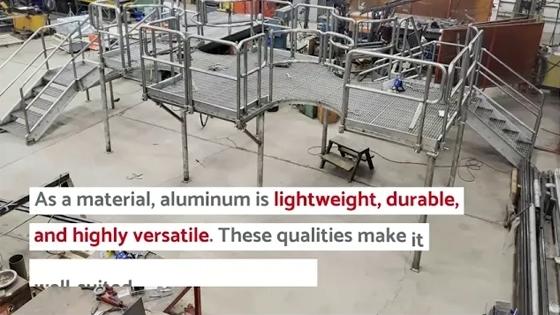Aluminum Handrail Fabrication
At Miracle Welding, Inc., we offer one-stop-shop solutions for industrial and commercial aluminum handrail. With over 41 years of experience manufacturing and welding high quality products and a manufacturing facility stocked with over 150 tons of material inventory, our team has the skills, knowledge, and tools to meet every customer’s aluminum handrail needs.
As a material, aluminum is lightweight, durable, and highly versatile. These qualities make it well-suited for use in handrail. By choosing to use aluminum, customers can select a railing style that fits their property’s needs without worrying about the heavy weight or corrosion risks other material alternatives face.
Aluminum’s advantages over other materials have led to more and more industries choosing the material for their railing needs. Some of the applications where aluminum handrail find use include:
- Arenas and convention centers
- Commercial buildings
- Distribution warehouses
- Hospitals
- Industrial facilities
- Manufacturing centers
- River walks
- Stadiums
Aluminum Handrail Fabrication
Manufacturers use several types of fabrication processes to produce aluminum handrail. These processes include:
- Bending. Assembly technicians hammer or press metal workpieces to create bend lines and bend two-dimensional pieces of metal into specific forms.
- CNC machining. CNC machines are automated tools that remove material from workpieces according to precise specifications. The process creates products with complex geometries, intricates design, and custom features such as screw holes.
- Curving. Curving has a looser or smaller radius bend than bending procedures. This technique creates softer bends and curves in aluminum rods or sheets.
- Cut-Off. Precision cut-off processes end metal rods and pieces at precise angles for simple assembly and future use.
- Drawing. Drawing processes stretch or pull metal sheets and wires into specific shapes and dimensions.
- Extrusion. In this process, technicians force metal through a die to create rods or bars with specially shaped cross-sections.
- Flanging. Stretch flanging is a forming or bending method that produces 90 degree bends.
- Pressing and stamping. These two processes use compression force to transform metal sheets into shaped surfaces with custom designs and features, such as grooves or punched holes.
- Stitching. Stitching is a cold process for repairing cracked or damaged metals.
- Welding. Welding joins distinct metal pieces by melting or fusing their joints together.
Why Use Aluminum for Handrail?
As indicated previously, aluminum offers several advantages over other materials, such as:
- Greater malleability and elasticity. Aluminum is more elastic than other metals, meaning it is less likely to crack or break under stress from physical impact or cold temperatures.
- Better cold resistance. The material’s resilience to the cold makes it ideal for exterior applications across the country.
- Superior corrosion resistance. Once aluminum is powder coated, it will not rust. The powder coating process binds a combination of thermoplastic or thermoset powders to the surface of the aluminum that prevents corrosion and other surface damage, such as peeling, cracking, or blistering.
- Less maintenance. The material qualities listed above lead to greater durability in finished aluminum products, resulting in lower maintenance requirements when compared to other available railing materials like steel.
Aluminum Handrail by Miracle Welding
At Miracle Welding, our team uses the following metalworking processes to produce aluminum handrail according to customers’ project specifications:
- Bending
- Coping
- Drilling
- Grinding
- MIG Welding
- TIG Welding
- Laser cut pieces
- Pipe forming
- Plasma cutting
- Sawing
To ensure we deliver complete, ready-to-use railings, we also offer our customers assembly, finishing, and painting services. All our handrail meet or exceed ANSI, ASME, ASTM, and AWS industry standards for safe and reliable construction. For specialty railings, we can also meet the standards established by the Department of Transportation and Mil-Spec standards.
For customers needing complete stair solutions, we also offer stair fabrication services. Similar to our handrail fabrications, we manufacture our stair from aluminum due to the material’s superior durability, strength-to-weight ratio, affordability, and recyclability. Each stair solution is tailored to a customer’s exact needs and designed to meet or exceed local, state, and federal standards, including ADA and OSHA requirements.
We’re proud to serve the following industries with our railing and stair fabrication capabilities:
- Building and construction
- Commercial
- Industrial
- Machine builders
- OEM
Contact Miracle Welding Today for Aluminum Handrail You Can Trust
Handrail increase compliance with safety and building standards in locations ranging from car lots to stadiums. For these and other applications, aluminum railings are the ideal option due to the construction material’s superior malleability and elasticity, cold resistance, and durability.
At Miracle Welding, we offer high quality fabrication services—including sawing, bending, and welding—for a wide range of industrial and commercial metal products, including aluminum handrail and stair. To learn more about our fabrication capabilities, contact our team today or request a quote to get your railing project started.

